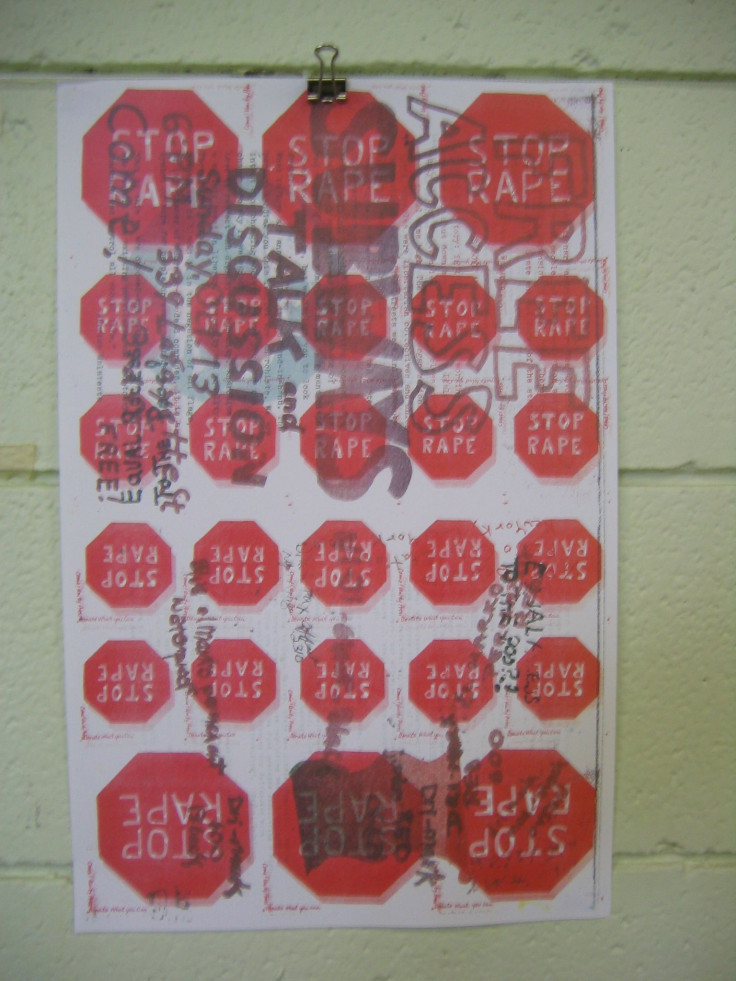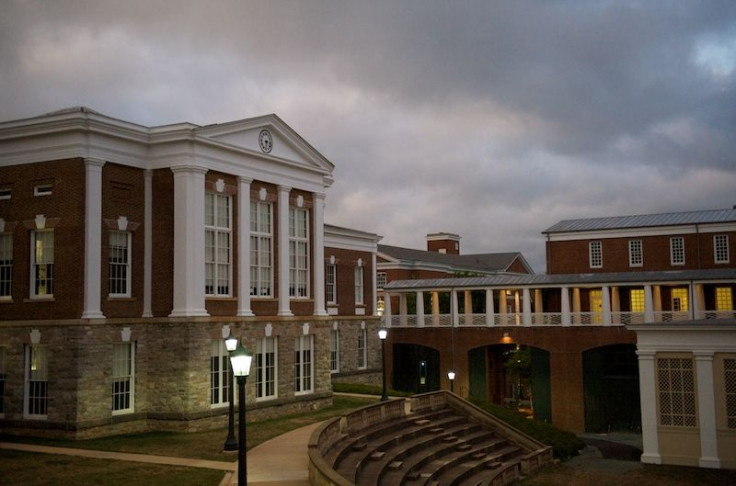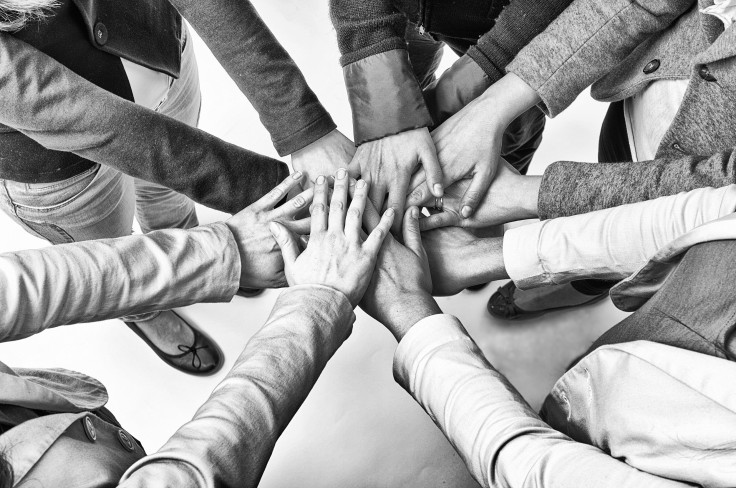Rolling Stone's Retraction Of UVA Rape Story Fuels Rape Culture: Why I Stand With Jackie

Rolling Stone magazine first introduced us to Jackie last month in its nearly 9,000-word feature on sexual misconduct at the University of Virginia. The story, grossly, is par for the course: Sexual misconduct is so rife in college that one in five women will be sexually assaulted during their time on campus. But Jackie's story was a harrowing one. In it were nauseating details of the night Jackie was gang raped at a Phi Kappa Psi fraternity party she attended as a freshman, being reduced from a fellow student’s date to "it" — as in "Hold its mother f*cking leg." Her story was unbelievable — literally, no one could believe rape was this aggressive.
Disbelief gave way to doubt, and this week, reports not only surfaced that the writer Sabrina Rubin Erdely failed to attempt interviewing Jackie’s alleged rapists, but Rolling Stone even went so far as to print a retraction on Friday morning. And in true boy’s club fashion, it threw Jackie under the bus. The note to readers curtly said, “In the fact of new information, there now appear to be discrepancies in Jackie's account, and we have come to the conclusion that our trust in her was misplaced.” The retraction now prefaces the original story.
After spending the week disrupting several of my colleague's productivity to discuss the details of this story, I was finally at a loss for words.
Jackie Isn’t The Problem
Ethical journalism, as written in The Society of Professional Journalist’s Code of Ethics, “strives to ensure the free exchange of information that is accurate, fair, and thorough.” Namely, ethical journalists “diligently seek subjects of news coverage to allow them to respond to criticism or allegations of wrongdoing.” So from this standpoint, as a writer myself, I understand reader concern regarding Erdely's decision to not interview Jackie's alleged rapists.
But, the code of ethics also requires journalists treat their sources like the human beings they are. Journalists balance the public’s need for information against potential harm or discomfort, and they realize that private people have a greater right to control information about themselves than anyone else seeking influence and attention.
Jackie requested Erdely not contact her rapists. Before RS issued its retraction, it stood by the story and Jackie. Tim Dickinson, who covers national affairs for the magazine but had no part in the story, was among RS’ defenders, taking to Twitter to cite The New York Times, Slate, and The Washington Post as additional publications who have featured cases of alleged sexual assault without making an attempt to name, let alone interview, the accused.
“If a reporter were doing a story about a university accused of failing to address the mugging or robbery of a student, that reporter would not be expected to interview the alleged mugger or robber,” Helen Benedict, a Columbia University journalism professor who has reported on sexual assault in the military, told The Times, in defense of RS prior to the retraction. “The piece might have been stronger with more than one source, but exposés of wrongdoing often start with one whistle-blower.”

The Neurobiology Of Trauma
The primary concern for Jackie’s case stems from inconsistency. Apparently, one of the boys she accused is not a member of Phi Kappa Psi, which has since been suspended through the New Year. Jackie is also reporting a greater number of attackers than she initially did, increasing from five to seven. Her friends, too, are claiming they've never spoken to RS. But this doesn’t make Jackie a liar. It makes her a victim.
“When a human being experiences an intensely threatening, terrifying event, there are really dramatic changes to the brain and how the brain functions,” said Dr. David Lisak, a clinical psychologist, in a video for the Arkansas Coalition Against Sexual Assault.
The frontal lobes are a sensitive and delicate part of the brain located right behind your forehead. They function to control your impulses, your emotions, and thoughts. When a person experiences something terrifying, it significantly impacts this part of the brain’s ability to function. Additionally, when you experience something that frightens or terrifies you, the brain’s amygdala branches back into the brain stem where there are cells secreting the neurotransmitters norepinephrine and dopamine. These two neurotransmitters handicap the frontal lobe, while also seeping into various neural circuits in the brain. Dopamine alters how the brain processes what’s going on.
“When the amygdala is firing, when the person’s experiencing something traumatizing rather than remembering or encoding an experience, experiences encode as intense fragments,” Lisak said. “And almost always they’re sensory fragments, so you remember sight, you remember sounds, you remember smells… What you’ll have is this whole scramble or jumble of very intense fragments and you may really not be able to remember things in sequence or know what happened.”
Coincidentally, the frontal lobes don’t fully mature until a woman is 21 years old — for men, it's fully mature around 25 or 26. At the time of her rape, Jackie was 18. And in most cases, traumatic abuse is reported up to 72 hours after the fact; Jackie is telling her story two years later. Two years of having to cope with her pain; her unsupportive, shaming friends and faculty; and of the possibility her alleged rapist is still on campus.
Dr. Rebecca Campbell, a psychology professor at Michigan State University, agrees with Lisak in that retellings of rape are often inconsistent and fragmented. It's so emotionally difficult to recall, and it prevents a victim from creating a linear progression of what happened.
“I refer to this as ‘secondary victimization,’ that sexual assault victims are having to relive the assault,” Campbell said. “And the way they are treated by the criminal justice system is disempowering, it’s victim-blaming, and it feels like they’re being raped all over again.”
Worse yet, law enforcement and reporters are still trained to associate inconsistency with lying. Yet, holding a rape victim to a flawless standard of storytelling isn’t just insensitive, it’s physiologically impossible.
A Violent Subculture
It remains to be determined if Phi Kappa Psi is home to Jackie’s alleged rapists. Actually, a lot of Jackie's story as we know it remains to be determined. But even if the narrative mismatches reality, fraternities on their own are sexually violent subcultures. One of Jackie’s attackers was egged on when chided, “Don’t you want to be a brother?” Wesleyan had a frat nick-named the “Rape Factory,” and who can forget Yale University’s frat brothers shouting, "No means yes, yes means anal."
Sexually violent fraternities aren’t limited to the big deal Ivy League campuses. These past weeks, several students from Ramapo College in Mahwah, N.J., and William Paterson University in Wayne, N.J., have been charged with gang raping women after fraternity parties and in their dorms. One case involves an 18-year-old woman who videotaped the sexual assault taking place.
Jessica Valenti of The Guardian reported that men who join fraternities are three times more likely to rape, and women who join sororities are 74 percent more likely to be raped.
“It’s mind-blowing,” Jane Stapleton, co-director of the University of New Hampshire’s Prevention Innovations: Research and Practices for Ending Violence Against Women, told Medical Daily. “A reporter from Bergen County (N.J.) called me the other day for my comment on the sexual assault taking place at Ramapo and she said she was so shocked. It’s shocking, it is, but I’m not shocked. This is happening all the time.”
Fraternity subcultures are a side effect of today's rape culture. To the uninformed, rape culture is a "pseudo-theory" courtesy of the "feminazis" working to take down the patriarchy. Those of us in the real world know rape culture is an umbrella term for victim-blaming, sexual objectification, and the denial of widespread rape, which is also sometimes referred to as rape apology. Society is so passive and tolerant of violence against women it practically dares it to continue.
Well, society and RS.

Support For Rape Victims
I wonder: what would the world be like if we put as much time and effort into believing victims of rape and sexual assault as we do in reprieving those accused of it? As it stands, about six percent of rape accusations are false. For those who still don't get it, or are just too scared to consider it (and it is insanely scary), a vast majority of rape accusations are true.
This is my biggest problem with RS. Its retraction mere days after fiercely standing by Jackie's story not only makes you wonder who exactly it's rolling over for, but it feeds an insidious rape culture. And RS’ managing editor Will Dana’s retraction to the retraction guaranteed their reader's takeaway would be Jackie's story is not true rather than focus on the way Erdely may have chose to tell it. I can't stress this enough: Erdely's shortcomings as a journalist have nothing to do with the credibility of Jackie's story. Instead, as Vox mentions, it just leaves Jackie vulnerable, which is wrong and irresponsible to all parties involved.
This vulnerability is why rape is so hard to report on. It's also why rape victims don't see their initial allegations through. “When victims report to the criminal justice system and it doesn’t go well, it has a very severe psychological impact that in turn can affect their long-term physical health and well-being,” Campbell said.
Also, what about the other victims of rape RS interviewed? Do they no longer stand by them? Frankly, if inconsistences common among rape victims makes them want to jump ship, with zero acknowledgment of their own writer's choices, then maybe don't report on rape.
I asked Stapleton why, given the many stories we hear (outside of RS) and the millions of dollars that goes into funding awareness campaigns, we're still meeting so many women like Jackie. "We don't have evidence rape [on campus] is happening less. We’re only hearing about them more," she said. "There’s still a great deal of misogyny and emphasis on hyper-masculinity for men. For all our efforts, there is still an incredible amount of inequality."
I believe you, Jackie. I believe every single rape victim who's been doubted and accused of inconsistent storytelling. And I hope you won't allow RS to discourge you from continuing to tell these stories, "too awful" or not, the way I'm scared it will.
This article originally incorrectly stated that one in five women will be raped during their time on campus. One in five women will be sexually assaulted, which includes but is not limited to rape.
Published by Medicaldaily.com



























